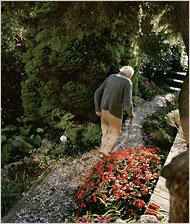Requiem in Pace
 Today is a very sad day in my world. Two luminary lights of poetry and historical theology have gone out. Stanley Kunitz, former poet laureate, died of pneumonia at 1oo years of age, and Jaroslav Pelikan died at age 82, of lung cancer.
Today is a very sad day in my world. Two luminary lights of poetry and historical theology have gone out. Stanley Kunitz, former poet laureate, died of pneumonia at 1oo years of age, and Jaroslav Pelikan died at age 82, of lung cancer.Stanley Kunitz' death, while not unexpected, hit me with great force, as I truly loved his restrained, well-crafted poems, which would often resemble an iron fist covered by a velvet glove. He was a poet of great hopefulness, gentleness, with a deep love of nature. Many of his poems confronted the suicide of his father, who died before his birth. This is especially poignant in the "The Portrait":
My mother never forgave my father
for killing himself,
especially at such an awkward time
and in a public park,
that spring
when I was waiting to be born.
She locked his name
in her deepest cabinet
and would not let him out,
though I could hear him thumping.
When I came down from the attic
with the pastel portrait in my hand
of a long-lipped stranger
with a brave moustache
and deep brown level eyes,
she ripped it into shreds
without a single word
and slapped me hard.
In my sixty-fourth year
I can feel my cheek
still burning.
Many recent admirers of Kunitz came from reading the last poem in his Collected Poems, "Touch Me," which ends:
What makes the engine go?
Desire, desire, desire.
The longing for the dance
stirs in the buried life.
One season only,
and it's done.
So let the battered old willow
thrash against the windowpanes
and the house timbers creak.
Darling, do you remember
the man you married? Touch me,
remind me who I am.
 Jaroslav Pelikan, a terror to many seminary students who had to read volumes of The Christian Tradition: A History of the Development of Doctrine" in five volumes, was my door to the early church. A much-lauded professor at Yale, Pelikan taught me more about Christian history and doctrine than anyone, and he taught me to love the interplay of theologians across time. He was a renaissance man, a concert pianist, a linguist, and a poet of a different sort than Stanley Kunitz. His poetry was of the Word made flesh, and the impact of the Incarnation into the thoughts and lives of men.
Jaroslav Pelikan, a terror to many seminary students who had to read volumes of The Christian Tradition: A History of the Development of Doctrine" in five volumes, was my door to the early church. A much-lauded professor at Yale, Pelikan taught me more about Christian history and doctrine than anyone, and he taught me to love the interplay of theologians across time. He was a renaissance man, a concert pianist, a linguist, and a poet of a different sort than Stanley Kunitz. His poetry was of the Word made flesh, and the impact of the Incarnation into the thoughts and lives of men.Rest in peace, Stanley and Jaroslav.



0 Comments:
Post a Comment
<< Home